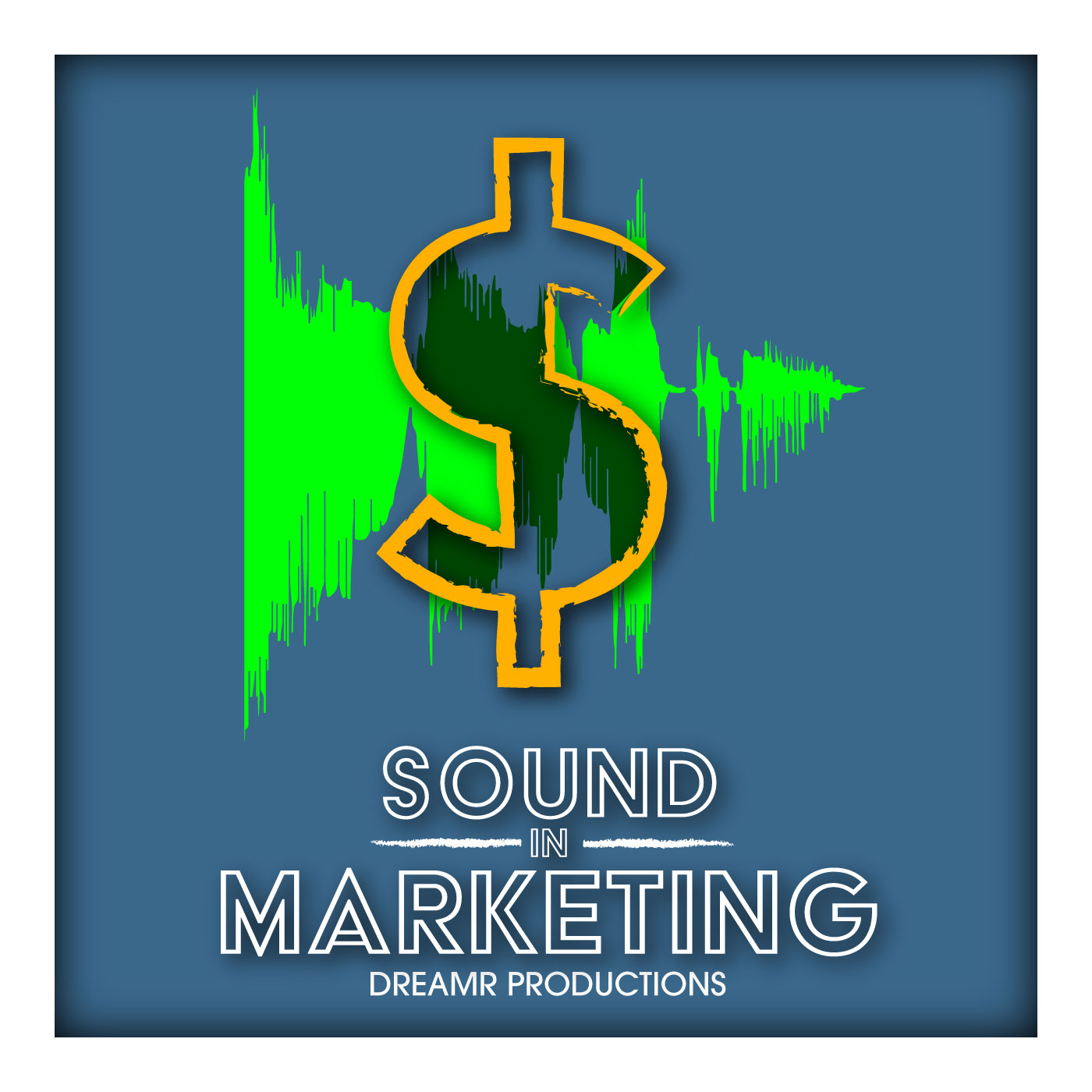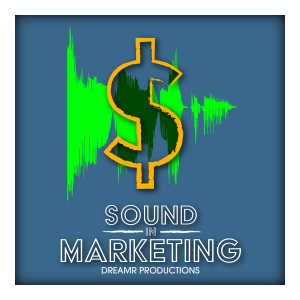
NBC, McDonald’s, Netflix, and State Farm all have a sound. Did you just sing it? Host Jeanna Isham of Dreamr Productions and Sound In Marketing Learning explores how far brands are willing to go to make their companies and products memorable and profitable through sound strategy. Let’s talk about it. Subscribe to the Sound In Marketing monthly newsletter today. http://eepurl.com/gDxl6b Let’s make this world of sound more intriguing, more unique, and more and more on brand.
Episodes

Wednesday Aug 21, 2019
Episode 9- Echo Dot and Voice Technology Review
Wednesday Aug 21, 2019
Wednesday Aug 21, 2019
Today’s episode is about….
Voice Technology. How the world is using it, seeing it, and what we expect from it already.
To read the full transcript- go to Episode 9 Blog Transcript at Dreamr Productions
This podcast is here to educate on the power of sound, the possibilities of sound and the accessibility of sound in marketing to all brands both big and small.
My name is Jeanna and I’m Head of Audio at Dreamr Productions and Stage Ham Entertainment. I create sound identities for companies, brands, individuals, and events.
According to the latest smart audio report from NPR and Edison Research, smart speakers in the US between 2017 and 2018 increased by 78% from 66.7 million to 118.5 million. Although the article, and actually quite a few of the articles I read, notate that the increase on buying smart speakers has started to decline, the popularity and notoriety of voice compatibility in consumer products is increasing. Originally voice compatible products and services was presented to offer something “different” and “cutting edge” but as voice assistants’ popularity has grown, it’s now something that we just expect to be able to access.
Most marketers have not figured out how to best utilize smart speakers and voice technology. Now's the time to experiment and learn and grow in this niche marketing industry. I believe that the real focus for marketers shouldn’t be in the speakers itself but how to best utilize the tech associated with them for their brands’ gain. People still see it as something shiny and new, as do marketers. The head scratching on next steps is still happening. Let’s get in on this on the ground floor!
I had been encouraging you to take the “Alexa Challenge” as I was calling it. I wanted you to buy an Echo Dot to do some R&D on it. I chose the Dot because it was, in my opinion, the lowest price point to get in on understanding Alexa technology as well as experiment on it with how your brand could be a part of that sound universe. I have no idea if you’ve done it yet but I bought mine during the Amazon Day Prime sales. What I’ve found so far has been highly intriguing.
First off, I put it in our living room and my family adopted it pretty quickly. Especially my 4 year old daughter. She asks Alexa things like “Alexa, can we have a play-date?” Obviously, Alexa does not understand her yet, but it’s pretty entertaining to listen to her responses. Although she asks silly questions a lot, she also just intuitively picked up on how to ask Alexa things in general. And here’s the cool part. She asked Alexa, “Alexa, play music” and a kid’s music playlist started playing. Alexa knew a child was talking to her.
I’ve also done the customaries. I’ve added to my grocery list and I’ve linked Pandora and Spotify. I also searched out my podcast. That took a little longer because it’s not on Amazon Music so I had to do a little extra work on the app on my phone first. I started to create a profile, which I think you can do all from voice activation but I got distracted with day to day things, as do we all. So I’ll have to go back to that later.
I’m also still not sure if by teaching my smart speaker about this Sound In Marketing podcast that it will rank hirer universally or if it’s just limited to my own machine’s understanding (which my guess is the latter).
Another thing that I noticed was that the tech was still largely dependent on the app. So not quite as “hands free” as one would assume. Or at least, as I had assumed.
Now there is a ton that I haven’t delved into yet but I think that that is the number one reason why we need to explore this now. By me not getting to all the features that Alexa has to offer yet, I believe models society today. The common consumer has not yet fully immersed themselves in this new tech.
Amazon posted a video which I’ll link in the show notes below about their “Alexa Pioneers”. It shows the amazing innovation that programmers are creating to serve a vaster audience with their product. They found a gateway and created their own path. I so wish I understood code but I don’t so I’ll just applaud these guys louder.
One of these “pioneers” that Amazon spotlighted is doing exactly what I’m encouraging us to do. Tushar Chugh created a smart cap for the visually impaired. The cap records the images and “narrates the scene to the visually impaired.” He’s solving an actual problem and using the tech to make it happen.
Voice as a person is another reason why I believe that there is no turning back from the direction we are going. I read another article that I shared on my Linkedin profile that really brought it all home for me.
Sixieme Son wrote a great article in Martech reporting on the status of voice assistants using the term that I love “Uncharted Creative Territory”. There was a lot of good information in this article but the part that really got to me was their comments on how in one study in England, Alexa was found to be “unsympathetic” and a “know-it-all”.
I don’t know exactly when voice tech started, or when it started becoming noteworthy to us commoners but this makes me laugh. Who would have thought 10 years ago that technology would not only be given a gender class but also that people would be upset that it wasn’t being more emotionally available for us. I don’t even think 5 years ago we would have had this experience or conversation. It just goes to show that we are growing by leaps and bounds and that the future is unknown.
I’ll try and expand on this in another episode but something else interesting I found in the Martech article. With the Alexa, Siri, and Hey Google technology comes the uniformity of activation words and phrases. What Michael from Sixieme Son so brilliantly posed was that with this tech comes huge notoriety for Google, Mac, and Amazon because everyone is familiar with their “voices”. Now these companies lose theirs just a little bit because the first thought recognition will go to the Power 3. Their companies’ recognition will come second. Perhaps in the near future there will be more players in the technology? Just look at what happened with Netflix. When once there is one, now there are tons! Just a thought.
I want this podcast to give you the information you need to create a successful sonic brand identity. As you join me on this journey, I hope that you’ll reach out and tell me what you find interesting, things you’d love for me to expand upon, things that flat out confuse you or you have no idea how to even begin comprehending. This voice accessible world is new to a lot of us and it’s outlets are growing each and every day. It’s new and ever changing. That’s why I’m here. To help bridge that gap between traditional marketing and this whole new way of thinking.
I hope you enjoyed this episode. Don’t forget to subscribe, follow, add to your library, and share with a friend. Have you read an interesting article lately, do you have any questions, do you have a really off ball event that you heard about that you want to send my way? Please share! You can find me at www.dreamrproductions.com, Linkedin, FaceBook or you can email me at jeanna@dreamrproductions.com. I want this podcast to be a collaborative event. I want it to be of benefit to us all so stop by and say hello.
Let’s make this world of sound more intriguing, more unique, and more and more on brand.
Sources:
https://developer.amazon.com/en-US/alexa/alexa-skills-kit/case-studies/alexa-pioneers

No comments yet. Be the first to say something!